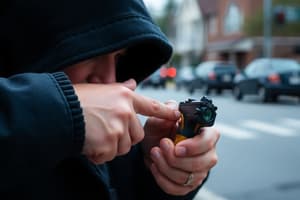Podcast
Questions and Answers
What are the key criteria to analyze theft crimes?
What are the key criteria to analyze theft crimes?
- How the defendant obtained the property (correct)
- Whether the defendant acquired custody of the property (correct)
- Whether the defendant intended to temporarily deprive the property
- All of the above
What is larceny?
What is larceny?
Unlawful taking of property in someone else's possession with the intent to steal.
An unlawful taking with the intent to temporarily deprive is considered theft.
An unlawful taking with the intent to temporarily deprive is considered theft.
False (B)
What does the doctrine of continuing trespass establish?
What does the doctrine of continuing trespass establish?
An honest mistaken belief negates the intent to permanently deprive.
An honest mistaken belief negates the intent to permanently deprive.
Does returning stolen property establish a lack of intent to steal?
Does returning stolen property establish a lack of intent to steal?
What constitutes abandoning stolen property?
What constitutes abandoning stolen property?
What is embezzlement?
What is embezzlement?
Conversion involves transforming possession of someone else's property to your own, which can include _____, consuming, or damaging it.
Conversion involves transforming possession of someone else's property to your own, which can include _____, consuming, or damaging it.
What negates the fraudulent intent in a conversion defense?
What negates the fraudulent intent in a conversion defense?
What do the forms of control include?
What do the forms of control include?
What defines robbery?
What defines robbery?
Flashcards are hidden until you start studying
Study Notes
Theft Crimes
- Involve unlawfully taking property from a victim with the intent to deprive them permanently.
- Analyzing theft requires understanding how property was obtained (trespass, delivery, trick), type of possession acquired (custody, possession, title), and intent to permanently deprive the owner.
Larceny
- Defined as the unlawful taking of property from someone else's possession with the intent to steal.
- Requires a trespassory taking and "asportation" of tangible personal property.
- Intent to permanently deprive the owner is essential for constituting larceny.
Continuing Trespass
- This doctrine states a trespass continues for the duration of possession.
- If a defendant initially intends to use property temporarily but later decides to keep it, that intent correlates with the original unlawful taking.
Intent in Larceny
- An honest but mistaken belief in one’s right to property negates the intent to steal, regardless of reasonableness.
- Reckless handling of property that risks loss fulfills the intent to permanently deprive.
Returning Stolen Property
- Returning property does not automatically rule out the intent to steal.
- If a defendant intends to return property unconditionally and within a reasonable time at the time of taking, no theft occurs.
- Prior intent to permanently deprive persists even if the property is returned later.
Abandoning/Selling Stolen Property
- Abandoning stolen property hoping for its return qualifies as larceny.
- Pawning stolen property can negate intent if the defendant planned to redeem it later.
- Intention to pay for or replace the stolen property can also negate the permanently deprive element.
Embezzlement
- Involves unlawfully converting property that has been entrusted to the defendant with intent to permanently deprive the owner.
- Statutory definition includes misappropriation of tangible personal property already in lawful possession.
Conversion (as an embezzlement action)
- Defined as transforming someone else's property for personal use in a way that seriously interferes with the owner’s rights.
- Examples include selling, consuming, or damaging property; minor actions like slight movement do not qualify.
Conversion Defense
- Intent to permanently deprive may be negated by an honest claim of right or intent to restore the exact property.
- Substituting converted property with equivalent items still constitutes embezzlement.
Forms of Control
- Title: Implies legal ownership and possession (e.g., buying a car).
- Possession: Full control over property without requiring title (e.g., renting a car).
- Custody: Physical control with limited use, often under strict conditions (e.g., test driving a car).
Robbery
- Defined as larceny that involves force or threat of force.
- An underlying larceny must exist to convict for robbery.
- An honest mistaken belief of ownership can negate intent in robbery cases.
Studying That Suits You
Use AI to generate personalized quizzes and flashcards to suit your learning preferences.





